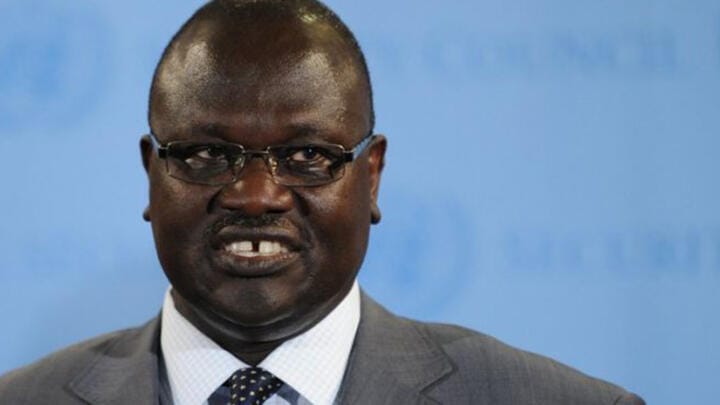The Sudan People’s Liberation Movement-in-Opposition (SPLM-IO), South Sudan’s main opposition party, has announced a temporary leadership structure while First Vice President Dr. Riek Machar remains under house arrest.
A group of senior party members meeting in Juba on Wednesday endorsed Peacebuilding Minister Stephen Par Kuol as the interim chairperson, saying the move is necessary to prevent a leadership vacuum within the party.
The decision comes amid deepening internal divisions. Several top SPLM-IO leaders, including Interior Minister Angelina Teny, Mining Minister Martin Abucha, and Secretary-General Regina Kaba, boycotted the meeting.
Despite their absence, a faction aligned with Kuol—including Federal Affairs Minister Lasuba Wango, Council of States Speaker Deng Deng Akon, and former Deputy Finance Minister Agok Makur—pushed ahead with the endorsement. Kuol will serve as interim chair until Machar is released.
“This decision is in line with the SPLM-IO’s structures,” Kuol told reporters. “We are not replacing our chairman permanently; we are addressing a temporary leadership gap caused by his detention.”
Kuol confirmed that Losuba Ludoru Wongo will act as deputy chairperson, and Agok Makur Kur will serve as interim secretary-general. He also announced a formal break with Nathaniel Oyet, the party’s exiled deputy chairman, stating that decisions must be made within South Sudan.
“The SPLM-IO cannot be governed remotely. Leadership must be exercised from within the country,” Kuol said.
Tensions have escalated since President Salva Kiir placed Machar under house arrest on March 26, following violent clashes in Upper Nile state between the army and armed civilians, reportedly linked to SPLA-IO forces.
In the aftermath, several opposition officials fled the country or went into hiding. On Monday, Oyet attempted to suspend Kuol and three other officials, accusing them of conspiring with the government. Kuol dismissed the move as illegitimate.
“We reaffirm our full commitment to the 2018 Revitalized Peace Agreement,” Kuol said. “This remains the only viable framework for sustainable peace and national reconciliation.”
He urged for an end to military offensives in Upper Nile, especially in Nasir and Ulang counties, and called for Machar’s immediate release, warning that continued hostilities undermine peace efforts.
The internal split mirrors a previous crisis in 2016, when Taban Deng Gai took over the party leadership after Machar fled Juba during renewed violence, later becoming vice president.
South Sudan, which gained independence from Sudan in 2011, has struggled with cycles of conflict. Though a peace deal was signed in 2018, its implementation has been slow and fragile. The transitional period was recently extended, with elections now expected in December 2026.
A recent African Union delegation was blocked from meeting Machar, and IGAD’s mediation efforts led by Kenyan envoy Raila Odinga have faced similar setbacks.
Amid mounting regional concern, observers say the SPLM-IO’s internal rift could jeopardize the broader peace process and South Sudan’s stability as the country moves toward elections.


